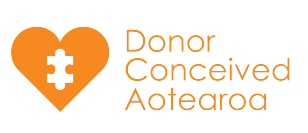October 11, 2022 | Donor Conceived People
Understanding Donor Conceived People (DCP)

Donor Conceived People are all people who have been conceived via sperm donation, egg donation or both processes. These people play a pivotal role in the decisions we make as Donor recipient’ parents. They are our children 20 years from now, and what they say and how they feel matters, and their voices need to be heard.
I have recently been in contact with Emma, a member of Donor Conceived Aotearoa, to find out more about donor conceived people (DCP) so I can create awareness. She shared the We Are Donor Conceived 2020 survey with me which has some important and useful insights, you can access it here - wearedonorconceived.
Donor Conceived Aotearoa has also shared their Basic Principles document with me, which I have copied and pasted below.

You can follow Donor Conceived Aotearoa on Instagram @donorconceivedaotearoa
Basic Principles for Understanding the Needs and Perspectives of Donor Conceived People
Our advocacy group - Donor Conceived Aotearoa is New Zealand based and we collaborate with other aligned groups and individuals to create sustainable practices and resources that ultimately transform the experiences of donor conceived people and their families. We have created this document as a resource for parents, donors and fertility services. If you know of an individual, group or organisation who would benefit from this resource, please get in touch.
Donor conceived people value openness and honesty about their conception story
Donor conceived people value openness and honesty about their conception story. Many donor conceived people who have “always known” – due to their parent/s telling them at a very young age (from birth to 3 years is ideal) and being open to the range of emotions that donor conceived people can feel about being donor conceived – are relatively comfortable with being donor conceived. Donor conceived people need to be celebrated for their whole selves, including characteristics and traits that come from the donor parent/s. It is critical that they do not feel ashamed of who they are and how they came to be.
However, it is important to note that early disclosure of donor conception does not make donor conceived people less interested in knowing the donor parent/s or their donor siblings. Further, early disclosure does not eliminate or prevent donor conceived people having negative feelings about donor conception. Parents should not have the misconception that early disclosure is ‘enough’. Nearly half of early disclosure donor conceived people report sometimes feeling sad, distressed or angry about their method of conception. Parents need to make themselves familiar with the range of perspectives of donor conceived people, so they can best prepare for their donor conceived child/adult.
Donor conceived people experience a range of emotions about donor conception
Donor conceived people experience a range of emotions about donor conception, which may change depending on their stage of life and experiences. Parents should be encouraged to hold space for a range of emotions to best support their child/adult and strengthen their relationship.
Donor conceived people would like the emotional freedom to express their perspectives
Many donor conceived people report that their parent/s are not aware of their feelings. They would prefer the emotional freedom to express any and all feelings that may arise. Donor conceived people can feel emotional pressure to feel or be a certain way with regard to donor conception, because they were “so wanted”, their parent/s struggled through infertility to have them, and/or it cost a lot of money and/or planning. Parents are encouraged to be aware of the need for providing truthful and factual information about their conception story without emotionally burdening their child.
Donor conceived people use a range of terms to describe the people who donated eggs/sperm/embryos to their parents to create them
Donor conceived people use a range of terms to describe the people who donated eggs/sperm/embryos to their parents to create them. These include donor, biological mother/father/parent, genetic mother/father/ parent. Donor conceived people may see themselves as having additional branches to their families, including the donor branch. Donor conceived people often feel their preferred terms are not accepted or respected by their raising parent/s, due to their parent/s feeling threatened or emotional about these terms. They would prefer that the terms they choose to use are accepted and respected by their parent/s. What they need from parent/s is active and open support in accepting this additional branch to their story.
Donor conceived people would like to know the identity of their donor parent
The majority of donor conceived people believe it is a basic human right to know the identity of both their biological parents. In Aotearoa New Zealand the concept of whakapapa (lineage/descent) is sacred to Māori culture and identity. Whakapapa connects people to the generations who have gone before, right back to the whenua (land) and atua (gods), and forward to the generations yet to be born. Knowing your whakapapa, the complete story of where you come from, and your whānaungatanga, those with whom you are closely connected, is the foundation for who you are.
Donor conceived people would like to know the medical history of their donor parent
The majority of donor conceived people believe they should have the option of knowing the medical history of their donor parent/s, for their own benefit and for the benefit of their own children. Many of those who do not have this information believe it has done them harm or has the potential to do them harm in the future.
Donor conceived people would like to develop a relationship with their donor parent/s
While many donor conceived people would like to develop a relationship with their donor parent/s, the nature of this desired relationship varies from person to person. The relationship is commonly imagined as a friendship or acquaintance, and for some may also be imagined as aparent /child relationship. Some donor conceived people do not desire any form of relationship with their donor parent/s.
Donor conceived people would like to know the identity of their donor siblings and develop a relationship with them
Most donor conceived people believe it is important to know the identity of their donor siblings and would like to develop a relationship with them. This desire increases in teenage years and adulthood. Getting to know donor siblings may be helpful for identity formation by providing genetic mirroring, in the absence of early contact with the donor parent/s. Genetic mirroring is most simply described as being able to see yourself in your family. Evidence from adoption research suggests that lack of genetic mirroring can be harmful. Donor conceived people who have had early contact with donor siblings report it has been beneficial to them.
Donor conceived people support limits on the number of offspring from a single donor
The majority of donor conceived people believe this number should be fewer than 10 offspring per donor. Managing relationships with more than 10 siblings can be complicated and emotionally burdening. In addition, donor conceived people worry about the possibility of accidental incest with a sibling, and this worry increases when the identity and number of siblings are unknown. This is also a concern for donor conceived people when they have children of their own, that their children will accidentally form intimate relationships with their cousins.
Donor conceived people support the need for pre-donation counselling for parents and donors
Donor conceived people support the need for pre-donation counselling for parents and donors. Donor conceived people acknowledge that donor conception is a complicated and emotional journey and that additional support and information is required for all parties to make ethical choices. Counselling needs to include a range of perspectives of donor conceived people so that donors and parents can make truly informed consent about donor conception.
Donor conceived people both value and need allyship from donors, parents and fertility service providers
Donor conceived people currently carry a disproportionate burden of advocacy in donor conception. As donors, parents and fertility service providers become aware of the needs and perspectives of donor conceived people, then we encourage them to take action to educate others in their friendship and family circles, workplaces, communities and politics.
Watch this documentary currently available on ThreeNow
Executively produced by Jason Momoa, and filmed over eight years, Rothman follows a group of adolescents who discover that they were conceived from the same sperm donor, forming an unlikely family of familiar strangers. There are presently 37 half-siblings, and counting. FUTURE PEOPLE explores the complexities of alternative conception while defining a new realm of modern family.
If you need help going through any block, talking with a TTC consultant can help! Book a FREE 15 minute virtual consult today!




